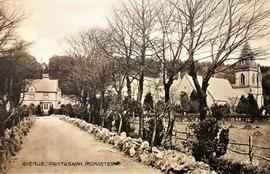Letters from An tAthair Peadar Ó Laoghaire, Castlelyons, County Cork, to Fr. Augustine Hayden OFM Cap. The letters include references to O’Leary’s Irish language activism, his thoughts on the teaching of Irish (including its use in religious instruction), his publications and translations, and grammatical issues in the day-to-day use of the language. Other subjects include O’Leary’s difficult relationship with the Gaelic League, and his enthusiasm for the temperance crusade. A letter (3 Mar. 1902) reads ‘Is it not a comical thing that the Dublin Gaelic League would not allow me to be the best judge of my own work!’ In another letter (20 March 1903), O’Leary wrote ‘Several years ago I had to cease writing for the official organs of the Gaelic League because they would insist on being allowed to mutilate my work. It was then that myself and a few friends got up the Irish Book Company. Ever since that time the working body of the Gaelic League in Dublin have been doing their big best to obstruct us directly and indirectly. … The Gaelic League is supposed to be non-sectarian. They could not, for example, get my Gospels printed at the expense of the League. There would be an outrage. If they were to print Gospels for me, how could they refuse to print Gospels for a Protestant minister!’ References are also made to both Norma Borthwick (1862-1934) and Mairéad Ní Raghallaigh, the founders of the Irish Book Company. In another letter (12 Oct. 1903), he referred to the inefficiency of constantly organising Irish language meetings. He added ‘If every person in Cork, or every third person, was studying the language in that way, Cork would be thoroughly “organised”, even though there were no meetings. The whole purpose of “organisation” is to get people to learn the language’. Referring to the Munster Feis, O’Leary wrote ‘I used to be mad when I used to see the citizens of Cork profiting by the Feis and contributing next to nothing to the cost of the Feis’ (22 Jan. 1904). In another letter, he refers to a conversation with Fr. Richard Henebry (1863-1916). O’Leary wrote ‘I was speaking some time ago to Dr. Henebry. He told me how, among the common people in America, a person dare not use the word “Bull”. His heavens would be “shocked”. He must say “gentleman cow”’ (15 June 1904). In another letter, O’Leary claims that ‘English is certainly the devil’s language! It is a terrible thing that even the prayers in it are so full of self-complacency. They are always looking around for the applause of fellow creatures’. In an undated letter, O’Leary wrote ‘It is unfair to be asked to translate into Irish expressions which are meaningless in English. The idea of a “sectional meeting” is one impossibility. If it be a meeting, how can it be sectional. If it is only a section, how can it be a meeting. How can a book be called a reader!’ In a letter dated 21 May 1919, he noted that it is better to write in English ‘in order not to be putting the censor to trouble’ and referred to a request to translate ‘the song for the Pope, the Royal Pope’ into Irish. In a letter dated 23 Oct. 1919 he affirmed that ‘in my early youth it was not an uncommon thing for a marriage to take place of a man and a woman neither of whom had any word of English’. Some of the undated correspondence seemingly relates to Father Augustine’s communications with O’Leary regarding the translation of temperance manuals and associated prayers and documentation.



